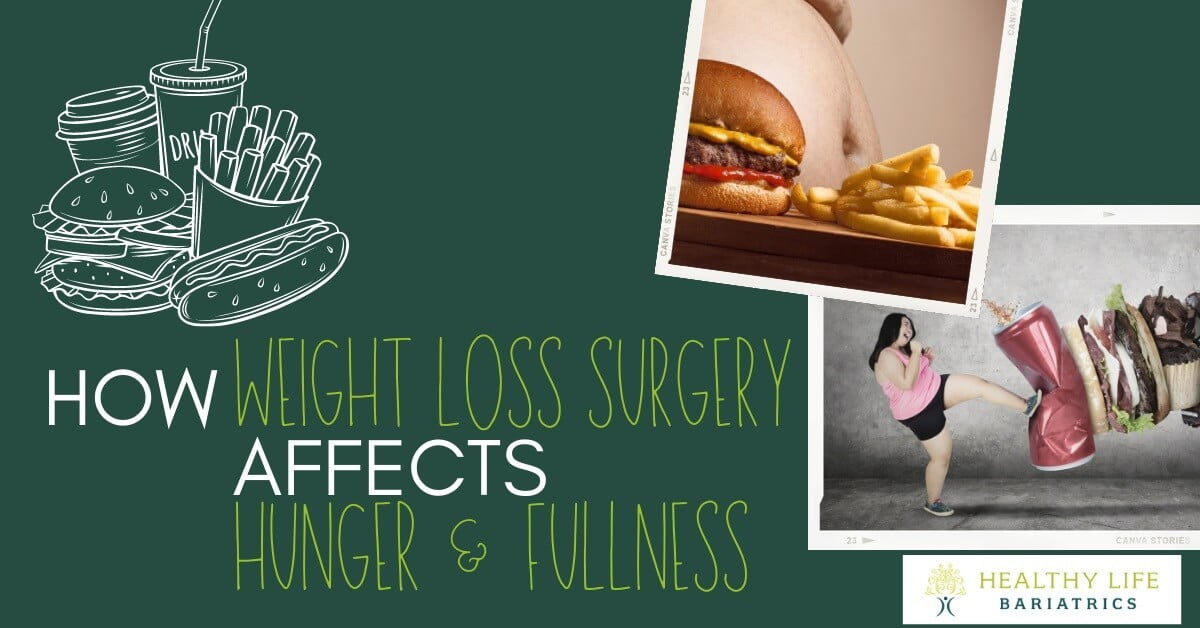
Slimming down with weight loss surgery is made possible thanks to two distinct fat loss mechanisms. The first is called restriction. Bariatric procedures like the gastric sleeve and Roux-en-Y gastric bypass restrict how much you can eat by making your stomach smaller. By eating less, you can begin losing a significant amount of weight quickly, and keep it off long-term. But the effects of weight loss surgery do not stop there.
The other mechanism that occurs as a by-product of the sleeve and bypass is an alteration of your hunger hormones. Most specifically, your body begins to produce less ghrelin and more leptin. These are the hormones that regulate hunger and fullness.
With a smaller stomach and less of an urge to eat, it’s no wonder weight loss surgery patients see such rapid weight loss. We’re talking five to fifteen pounds a week for the first thirty days and as much as 20% of your excess weight lost in the first two months.
By understanding the effects of ghrelin and leptin on your body, and their ability to affect hunger and fullness, you can better prepare yourself for the amazing results of weight loss surgery.
How Weight Loss Surgery Alters Your Hunger Hormones
With both the gastric sleeve and gastric bypass, around 80% of your stomach is removed. The remaining portion is converted into a banana-like sleeve. That sleeve or pouch holds less food as you eat. The ability of bariatric surgery to limit your food intake has a significant impact on the production of hormones within your body. The effects of weight loss surgery are still being studied, but we do know that leptin and ghrelin seem to be heavily altered following many bariatric procedures.
Leptin

When you eat, there comes a point when you begin to feel satisfied. This is the effect of leptin on your body. Leptin is produced in your fat cells. When the hormone is produced, the brain receives a signal that you feel full. The purpose of the hormone is to stop you from overeating.
Ghrelin
Ghrelin is leptin’s counterpart. When ghrelin is produced, the brain receives a signal that it’s time to eat. When you begin eating, leptin will be produced at some point to tell you to stop. The two hormones are intended to work in perfect harmony, with one keeping the other in check. With this system, the body gets enough calories while preventing excess fat storage.
That’s how the hunger hormones are supposed to work. In some people with obesity, their bodies have built up a resistance to leptin or their bodies produce too little leptin for their brains to perceive satiety. No wonder you feel so hungry all the time, even though you may have recently eaten. When leptin doesn’t work as it’s supposed to, you can find yourself overeating all day, every day. This resistance to or lowered production of leptin has contributed heavily to the obesity epidemic.
Sadly, too many obese individuals blame themselves for their weight gain. If you are obese and you constantly feel as though you’re “starving,” leptin may be to blame – not your resolve. The problem becomes compounded when you let the excess pounds get you down. Feelings of low self-worth can lead to depression, which can in turn cause your body to burn fewer calories at rest. This leads to a never-ending cycle that can only lead to significant weight gain. Weight loss surgery can help.
The Sensations of Hunger and Fullness After Weight Loss Surgery
Studies on weight loss surgery patients have shown an increase in leptin production after the procedures. With more leptin, you’ll begin to feel satisfied much faster during meals. You’re already eating less because of your smaller stomach. Leptin makes it even easier not to over-indulge.
What if your body is resistant to leptin? It’s true that an increase in the fullness hormone won’t matter much if your brain cannot perceive the change. However, if your body has up until surgery produced very little leptin, and your levels suddenly increase, this could be a game changer, leading to your ability to finally lose weight.
In addition to more leptin, bariatric procedures have been shown to decrease the production of ghrelin, which is produced in the stomach. Enter into the equation a greater amount of leptin and you have a recipe for staying on track with any post-surgery diet. If you always felt hungry before weight loss surgery, feeling less hungry, and fuller faster, will be a welcome change. For once, your life won’t be ruled by food. You can begin living life on your terms with your new slimmer body and surging energy levels.
Other Changes Affecting Hunger Following Bariatric Surgery

With less ghrelin and more leptin, and with a reduced stomach, eating less food will become much easier. But what about making good food choices? You can still eat less and over-eat if you choose sugar, fat, and other bad foods in place of healthier ones.
Amazingly, many bariatric patients have reported a change to their typical food cravings after surgery. The changes made to the body, and the effects those changes have on the body, are still being studied. But many patients report changes to their taste buds and olfactory nerves, which makes food taste and smell different. This can affect your desire to eat certain foods, making it easier to push away junk in favor of foods that are good for you.
Conclusion
From the moment you wake up from surgery, your life will be different. By undergoing surgery, you will have enacted a catalyst for losing weight quickly. Weight loss surgery is no magic trick, however. It’s going to take effort on your part to make good food choices and exercise after you’ve healed from surgery.
You must make a conscious effort to lose the excess pounds and keep them off. Luckily, you’ll have the effects of weight loss surgery on your hunger hormones backing you up, leading to greater chances of long-term success.
Learn more about the effects of weight loss surgery on the body by scheduling a consultation with Dr. Babak Moeinolmolki of Healthy Life Bariatrics. As a world-renowned bariatric surgeon, Dr. Moeinolmolki helps patients throughout Los Angeles, Encino, and Glendale – and all over the world. Call today and book a time that works best for you (310)861-4093.

